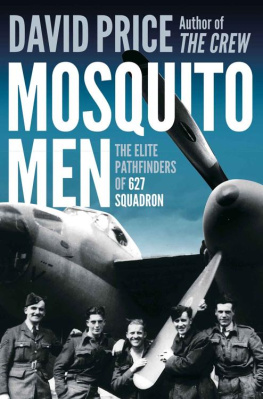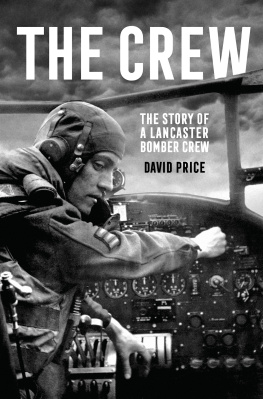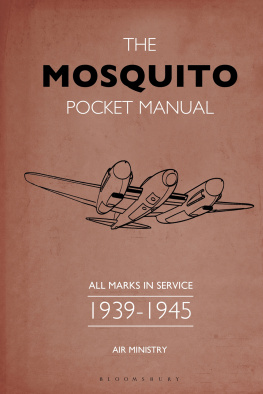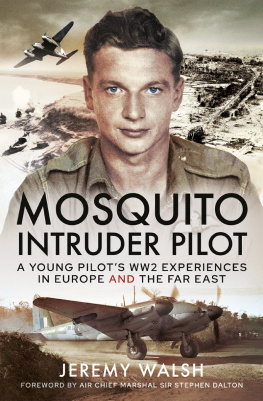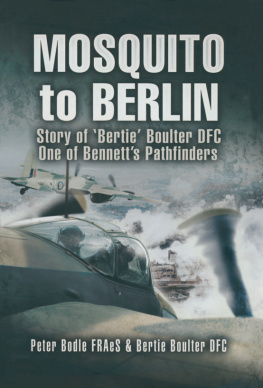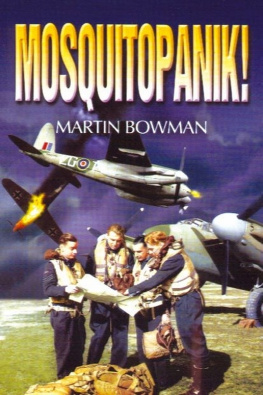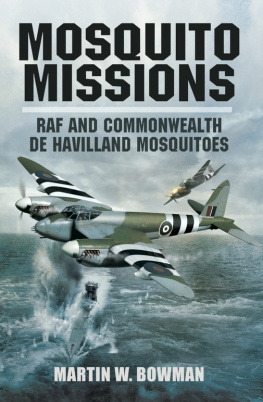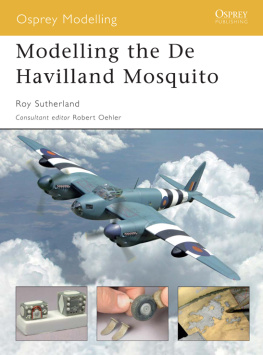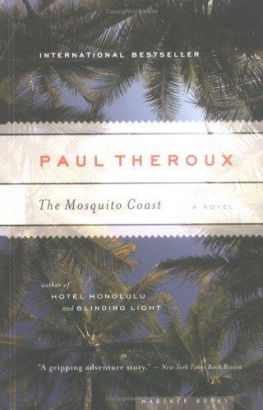David Price - Mosquito Men
Here you can read online David Price - Mosquito Men full text of the book (entire story) in english for free. Download pdf and epub, get meaning, cover and reviews about this ebook. year: 2022, publisher: Bloomsbury Publishing, genre: Detective and thriller. Description of the work, (preface) as well as reviews are available. Best literature library LitArk.com created for fans of good reading and offers a wide selection of genres:
Romance novel
Science fiction
Adventure
Detective
Science
History
Home and family
Prose
Art
Politics
Computer
Non-fiction
Religion
Business
Children
Humor
Choose a favorite category and find really read worthwhile books. Enjoy immersion in the world of imagination, feel the emotions of the characters or learn something new for yourself, make an fascinating discovery.
- Book:Mosquito Men
- Author:
- Publisher:Bloomsbury Publishing
- Genre:
- Year:2022
- Rating:4 / 5
- Favourites:Add to favourites
- Your mark:
- 80
- 1
- 2
- 3
- 4
- 5
Mosquito Men: summary, description and annotation
We offer to read an annotation, description, summary or preface (depends on what the author of the book "Mosquito Men" wrote himself). If you haven't found the necessary information about the book — write in the comments, we will try to find it.
Mosquito Men — read online for free the complete book (whole text) full work
Below is the text of the book, divided by pages. System saving the place of the last page read, allows you to conveniently read the book "Mosquito Men" online for free, without having to search again every time where you left off. Put a bookmark, and you can go to the page where you finished reading at any time.
Font size:
Interval:
Bookmark:
MOSQUITO MEN
The Crew: The Story of a Lancaster Bomber Crew A Bomber Crew Mystery: The Forgotten Heroes of 388th Bombardment Group
Kieron Collection, Air Team Images
DAVID PRICE
MOSQUITO
MEN
THE ELITE PATHFINDERS OF
627 SQUADRON

www.headofzeus.com
First published in the UK in 2022 by Head of Zeus Ltd,
part of Bloomsbury Publishing Plc.
Copyright David Price, 2022
The moral right of David Price to be identified as the author of this work has been asserted in accordance with the Copyright, Designs and Patents Act of 1988.
All rights reserved. No part of this publication may be reproduced, stored in a retrieval system, or transmitted in any form or by any means, electronic, mechanical, photocopying, recording, or otherwise, without the prior permission of both the copyright owner and the above publisher of this book.
A catalogue record for this book is available from the British Library.
ISBN (HB): 9781800242296
ISBN (E): 9781800242319
Head of Zeus Ltd
58 Hardwick Street
London EC R RG
WWW . HEADOFZEUS . COM
To my father, whose passion for history is an inspirationContents



Writing about the de Havilland Mosquito engendered a certain amount of trepidation in me. Previous authors have covered almost every technical specification of this legendary aeroplane, from tyre sizes to the thickness of its wooden composite construction. They have written in detail about its outstanding performance and the many and varied roles it played throughout the Second World War. With so many studious tomes written on this most fascinating of aircraft, was there anything new to say?
As a subject for a storyteller, the Mosquito does not disappoint. Novel in construction and exceptionally fast, it encouraged feats of audacity and courage on the part of its fliers. It is an aircraft that from its earliest development placed new capabilities in the hands of its crew; for the Royal Air Force, it became the first true multi-role combat aircraft. What tends to be missing from the many accounts of the Mosquito are the stories of the men who flew them. Their names and ranks appear, but we learn very little about who these men were and where they came from or how they came to be flying one of the most advanced aeroplanes of the era.
Some years ago I had the pleasure of welcoming the Commander of the Battle of Britain Memorial Flight to a Veterans Day at my local air museum. He had just dazzled the crowd with a low pass in a shining blue Mark XIX Spitfire, its Rolls-Royce Griffon engine producing the combination of musical note and growl that drew spectators like a magnet to the runway boundary fence. There was no denying that this most iconic of Second World War aircraft could woo a crowd into a state of misty-eyed romanticism. Later, over a mug of coffee, the Wing Commander confessed that it was the aeroplanes people came to see, and not the pilots. This truth struck a chord with me and, as an aviation enthusiast of many years standing, I realized that I too could be guilty of neglecting that most critical component of any aircraft, housed in the cockpit its crew. The success of any wartime operation was not solely about the technical prowess of the flying machine, but at heart had to be about the skill and character of the men who controlled it.
It was while carrying out research for my previous book, The Crew: The Story of a Lancaster Bomber Crew , that I first came across the fearless young men of 627 Squadron, who were involved in low-level target marking in de Havilland Mosquitos. Apart from an excellent book published by the Squadron Association in 1991, At First Sight a selection of first-hand accounts by the airmen themselves there has been no comprehensive study of their exploits. This volume, alongside the expanded writings on the 627 that appear on the Squadron Association website, has been invaluable. All of its contributors, bar one, at the time of writing, are no longer with us, but by corresponding with their families I have been able to piece together their experiences of flying with the Squadron. Their family archives provide a treasure trove of previously unseen photographs, diaries and word-of-mouth accounts that deserve to reach a wider audience. The constraints of space mean that the personal stories I tell here represent only a small proportion of the riches contained in these resources, but hopefully enough to allow the reader to enter these mens lives for a short time, and to share a small part of their experience of flying the de Havilland Mosquito.
Over the past thirty years, I have taken every opportunity I could to speak to the remaining eyewitnesses of the air war. To spend time talking to old men about their youth is always rewarding, amusing and poignant often all in the same sitting. I count it a great privilege to have been able to visit and speak to Ken Oatley to my knowledge the last surviving airman of the illustrious group who flew with 627 Squadron. His accounts are particularly vivid, his sharp mind recalling wartime events as if they had taken place only yesterday. He is the last among us to have seen their target grow large in the small windscreen of a Mosquito as it dived to place its markers. Ken met and served with such men as Guy Gibson and Leonard Cheshire. His period of combat flying was a brief interlude in his one-hundred years of living, yet, as with so many of his compatriots, the experience forged his character for the years ahead.
Investigating the exploits of 627 Squadron requires the writer not only to tell the story of the de Havilland Mosquito itself, but also in order to set this singular aircraft in its strategic context and explain the necessity of its particular method of flying to provide some wider background narrative of the bombing war in which it took part. There is, accordingly, some overlap between Mosquito Men and my previous book, The Crew , but I have wherever possible attempted to keep repetition within bounds. The narrative of The Crew was built around the lives of seven airmen who flew together in the same heavy bomber; Mosquito Men offers more of a tapestry of characters, all of them interconnected by their association with an extraordinary flying machine, but each coming with his own unique story. I make no apology for including extended details of the crews lives and experiences before they joined 627 Squadron. The character and skills of the men who flew the Mosquito were forged by what they had learned from flying other types of aircraft, so I felt it important for this book to capture that crucial element of their previous experience. It is notable that the men who excelled at 627 Squadron were in the final stages of their operational careers for many of them, service on the Mossie was their swansong as aircrew.
I am much indebted to the unnamed hundreds of enthusiasts who have striven to build websites to catalogue Second World War operations. The lengths they have gone to and the exactitude with which they have carried out their task can sometimes appear beyond comprehension. Without their collective input it would not have been possible to present even half of the detail contained in this book. Underpinning all research are the records held at the National Archives at Kew. The digitizing of millions of typewritten pages enables authors to explore a subject at an ever-expanding level of detail. I apologize to aviation enthusiasts that I have not been able to cover the career of other Mosquito squadrons in detail, or to spend more time writing about the in-service development of this outstanding aeroplane. Some significant elements of the story of the de Havilland Mosquito are absent from this account, but my focus on just one squadron allowed me only limited space to mention others.
Next pageFont size:
Interval:
Bookmark:
Similar books «Mosquito Men»
Look at similar books to Mosquito Men. We have selected literature similar in name and meaning in the hope of providing readers with more options to find new, interesting, not yet read works.
Discussion, reviews of the book Mosquito Men and just readers' own opinions. Leave your comments, write what you think about the work, its meaning or the main characters. Specify what exactly you liked and what you didn't like, and why you think so.

